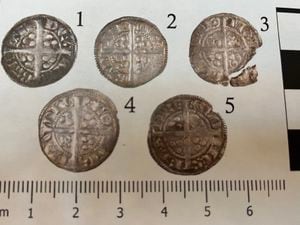Top female artist's painting on display
A painting by a top female artist of the late Victorian era – who was unusual for specialising in large scale military and battle scenes – has gone on display at Shropshire Regimental Museum.

The oil painting by Lady Elizabeth Butler was displayed for many years in the Officers’ Mess of the King's Shropshire Light Infantry at Copthorne barracks in Shrewsbury.
However, with the recent closure of the barracks it has now passed to the museum's collection at Shrewsbury Castle.
Elizabeth Thompson – who became Lady Butler on her marriage to Lieutenant General Sir William Butler – was one of only a handful of female painters to achieve fame for history paintings, and especially battle scenes. She lived from 1846 to 1933.
Acting museum curator Peter Duckers said: "She painted some of the most well-known and iconic military paintings the era, drawing her inspiration from famous British battles and wars of the past, like Waterloo and the Crimea, as well as on events contemporary to her time, like scenes from Egypt and the Sudan and the Boer War.
"Her well-known paintings include The Roll Call (Inkermann - Crimea, 1854), The Remnants of an Army (First Afghan War, 1841), The Defence of Rorke's Drift (Zulu War, 1879), Scotland Forever! (the charge of the Scots Greys at Waterloo) – and many more, up to and including scenes set in World War One.
"She is regarded as one of the foremost military artists of her time and her paintings are on display in some of the world’s leading galleries and museums.
"The painting now on display in Shrewsbury Castle was completed in 1892 and is entitled 'A Halt on a Forced March.'
"It was originally the property of Captain P.L. Kingscote of the KSLI, who donated it to the regiment in 1976.
"It shows an incident during the war against Napoleon in Spain – an exhausted Royal Horse Artillery gun crew rests during the arduous 'Retreat to Corunna' in the bitter winter of 1808, during the Peninsular War."





